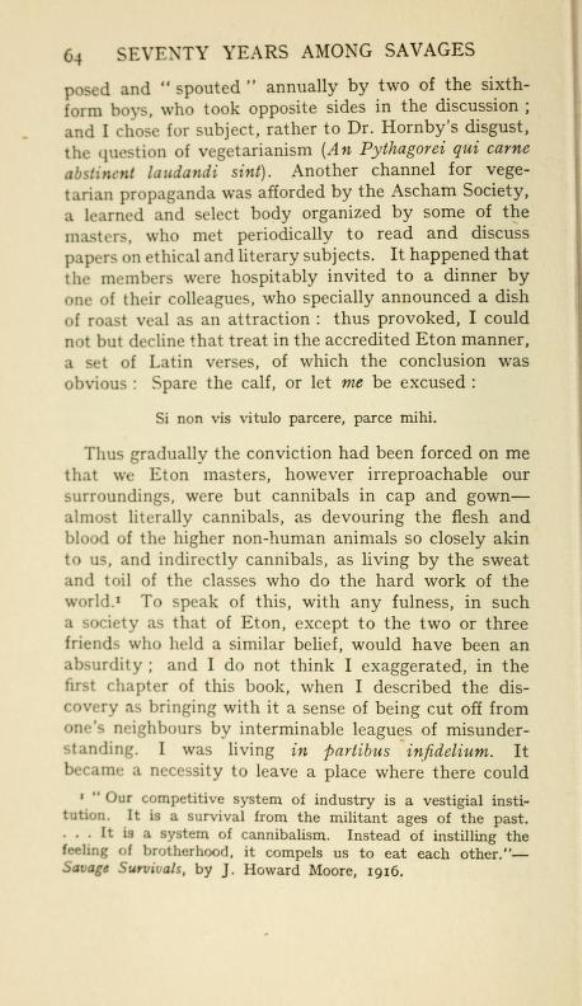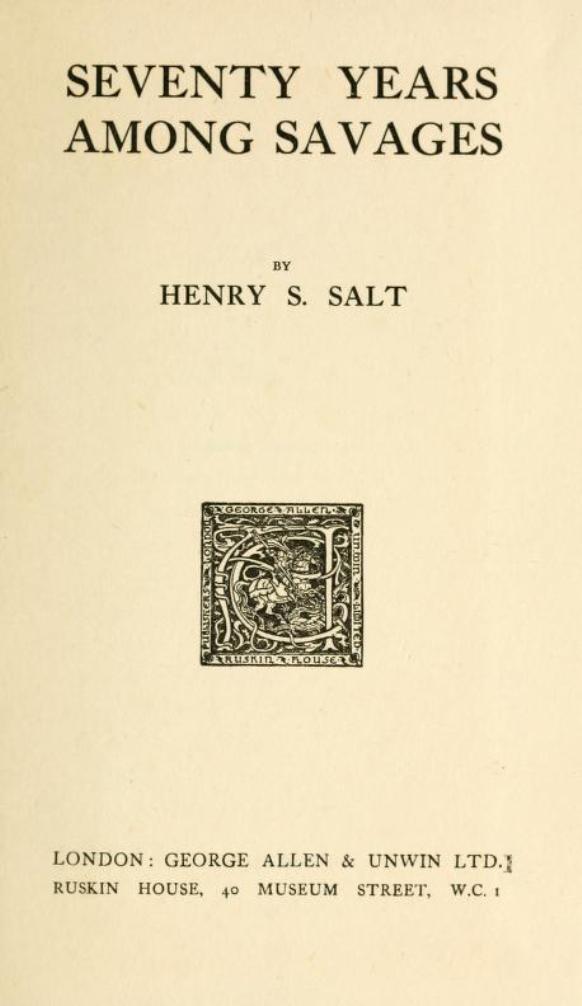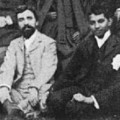We could add many more links & notes to this blog piece. Vegetarianism, early veganism, the dawn of the animal rights movement, the roots of socialism, humanitarianism, the anti-vivisection movement, the suffragette movement, the anti-child labor movement & closely related causes, in 1880s & 1890s London, are most interesting topics to study.
Probably 20% of our Ernest Bell Library collection is related in some way to these movements / causes & to this period.
Today I will focus on some of the roots of veganism, & its connection with socialism.
The ‘conflicts’ / challenges are the same today as they were in the 1880s – the people, of course, are different.
……but we can learn from the history.
In the next section the word ‘vegetarian’ is primarily used. In the 1880s it was clearly understood that full vegetarianism excluded ALL animal products.
———
Some quotes, important ones for persons interested in our history
Henry S. Salt explaining Socialism –
…the main contention of Socialists is that the land and the means of production belong rightfully to the people, and not to the present occupiers. If two parties claim one and the same property, it can hardly be called a theft to institute an enquiry as to which is the rightful owner, with a view to a possible restoration of the stolen goods.
&
…non-workers steal the produce of the labouring classes. The fact that individuals cannot remedy this systematic wrong does not in the least disprove the existence of the evil; at any rate they ought to have the grace to acknowledge the source from which their comforts are derived, and to join in the attempt to bring about as speedy a reform as possible. Unfortunately this is a course to which the capitalist classes seems specially disinclined. They insist that they are the rightful possessors of wealth which comes in to them without any labour on their part, and attempt to raise the cry of “Stop thief” against those who venture even to investigate the origin of their wealth. Our capitalists persist to the bitter end in the fatuous assertion that to live idly on the labour of others is not the same thing as to steal. – Henry S. Salt – in his essay – ‘Thou Shalt Not Steal’ – Published: Justice, March 14, 1885 – No. 61 – here in full
…all very good – but ‘how unfortunate’ that Henry S. Salt also worked to establish Animals’ Rights.
Henry Mayers Hyndman‘s (in)famous quip from 1881 –
I do not want the (socialist) movement to be a depository of old cranks, humanitarians, vegetarians, anti-vivisectionists, and anti-vaccinationists, arty-crafties and all the rest of them. – H. M. Hyndman (1842–1921) an English writer and politician, and the founder of the Social Democratic Federation and the National Socialist Party.
Leon Trotsky –
…we were never concerned with the Kantian-priestly and vegetarian-Quaker prattle about the “sacredness of human life. – Terrorism and Communism : A Reply to Karl Kautsky (1920), Chapter 4: Communism
Steve Best paraphrasing Marx & Engels –
In the Communist Manifesto, Marx and Engels lumped animal welfarists into the same petite-bourgeoisie or reactionary category with charity organizers, temperance fanatics, and naïve reformists, failing to see that the animal welfare movement in the US, for instance, was a key politicizing cause for women whose struggle to reduce cruelty to animals was inseparable from their struggle against male violence and the exploitation of children. – Rethinking Revolution: Animal Liberation, Human Liberation, and the Future of the Left – Steven Best – in full here
Sorry H. M. Hyndman, Trotsky, Marx & Engels – but Henry S. Salt & friends had other plans – for them it was Socialism for the benefit of both ‘humans & other animals’!
H. M. Hyndman emphasizes the importance of James Leigh Joynes & Henry S. Salt to Socialism –
Though the names of (J. L) Joynes and Salt are usually left out of the history of socialist movements, their contribution to the revival of Socialism in the early nineteenth-eighties was great (see H. M. Hyndman, ‘The Record of an Adventurous Life’). Their mere giving up of their Eton master-ships for the movement was significant enough as a victory to be boasted about in socialist public meetings; and their intellect and literary skills were also most welcomed in the movement. Salt … remained at the centre of the movement and regularly contributed to the major socialist journals. Salt was a writer of force and feeling, and his talents were always highly praised in socialist circles. – Chien-hui Li – in – ‘Henry Salt and the Humanitarian League’ – see – http://www.henrysalt.co.uk/reformer/socialism
H. M. Hyndman himself –
One result of this meeting was to bring to us a knot of very clever enthusiastic young men who then were bringing out the Christian Socialist Joynes, Champion, and Frost, with them H. S. Salt and two or three more, were as promising and capable a set of men as ever threw in their lot with an advanced movement. Even their names are now almost forgotten, but the good work they did has survived both death and disappearance. J. L. Joynes had been a master at Eton and had given up his place on conscientious grounds. No more genial, fearless, and lovable personality ever took part in our movement than Joynes, and his literary ability was of great service. ……… His early and lamented death, I lay to the door of the vegetarians. Vegetarianism may keep a lot of useless people alive: it certainly killed a valuable and delightful personality in J. L. Joynes. Notwithstanding his chaff of ”Quarrelsome Corpse Eaters,” as he called us flesh-consumers, he was taken and we were left — quarrelling. – H. M. Hyndman, ‘The Record of an Adventurous Life’ – p280 – scroll to find the page.
H. M. Hyndman again –
A list of our speakers and writers alone is even now sufficient to show where we were in those days. Morris, Bax, Champion, Quelch, Thome, Burns, Williams, Herbert Burrows, Joynes, Salt, Frost, Eleanor Marx, Keddell, Andreas Scheu, Annie Besant, Edward Aveling, Hobart, Hunter Watts, Helen Taylor, the Murrays — this made up, with others not named, a very strong combination indeed. Lee, our Secretary, also joined us at this time. It was reasonable, with such a group of men and women gathered round, an effective weekly journal, and with a well-organised centre as a rallying point, to believe that in a few years we might rival the strength and discipline of the German party, while possessing some of the life and unexpectedness of the French. – H. M. Hyndman, ‘The Record of an Adventurous Life’ – p 317 & 318 – scroll to find the pages.
So, though these individuals were intolerant of vegetarians, many of the most important core supporters of early socialism in the UK were simultaneously ‘vegan-gelicals’, & stalwarts also of the ‘Humanitarian League’.
Remember that Karl Marx was living in London until his death in 1884, Eleanor Marx was his daughter.
In 1849 he (Karl Marx) was exiled and moved to London together with his wife and children, where he continued writing and formulating his theories about social and economic activity. He also campaigned for socialism and became a significant figure in the International Workingmen’s Association. – Wiki
———
1928 – a time in between two Socialist Governments
J. L. Joynes would have ‘fitted right in’ on 2015 Facebook with his – ‘Quarrelsome Corpse Eaters’ quip!
Henry S. Salt had his own style.
Some verse – with an AABBA rhyming scheme – …laid out almost as a limerick!
The Socialist not a Vegetarian
His theme is Exploitation: the rich Few Battening on labour of the Many. True— But look within his larder. Will he dine Himself on limbs of slaughtered sheep and kine? Are those poor sufferers not exploited too?
Henry S. Salt The Vegetarian Messenger and Health Review, Vol. 25 No. 2, February 1928
Some Vocabulary – Henry S. Salt was an Eton master & a scholar of Greek & Latin – his vocabulary was wide.
theme = topic (a noun)
batten = to strengthen (a verb)
battening on labour = becoming stronger by exploiting the working classes
larder = a room or large cupboard for storing food (a noun)
kine = cows (a plural noun)
Some folk have a hard time with verse, so let’s put it into prose form (sorry Henry S. Salt).
The socialist’s theme is exploitation: the rich few battening on labour of the many.
True – but look within his larder.
Will he dine himself on limbs of slaughtered sheep and kine?
Are those poor sufferers not exploited too?
More of Henry S. Salt’s verses – here.
In 1928 Labour, when this was published, the UK’s most socialist party had been in opposition for 4 years – since 1924. The General Strike had taken place in 1926.
Of course, the quarrelsome politicians of all persuasions were mainly munching on flesh, eggs & dairy products!
———
‘Beasts of Burden’
Coming more up-to-date – this is an influential vegan-socialist pamphlet, first published in late 1999 by Antagonism Press.
Its authorship remains a mystery-
The pamphlet was explicitly aimed at both socialists and animal advocates, in the hopes of beginning the process of unifying their respective struggles.
More comment here about the pamphlet.
A section from – ‘Beasts of Burden’ –
1.6 Animals and the origin of the factory system
Capitalism tries to squeeze the last drop of life out of human beings, intensifying the work process to eliminate all non-productive movements. It seeks the ‘eradication of any uncontrolled movement of the hand, any unproductive glance of the eyes, any unwanted wandering of the mind’. Similarly with animals, the aim is to eliminate everything that does not contribute to the final product, to turn them into machines for the conversion of feed into meat or other commodities.
With animals as with humans, the factory system aims to restrict the movement of the body to maximise profits. Factory farming was already established by Roman times; Plutarch writes that ‘it is a common practice to stitch up the eyes of cranes and swans and shut them up in dark places to fatten’. In seventeenth century England pigs, poultry and lambs were fattened by being confined indoors in darkness; ‘Geese were thought to put on weight if the webs of their feet were nailed to the floor’. Then as now, the movement of animals was restricted because it burned up calories and therefore slowed down weight gain.
The same basic techniques are still in use in modern factory farming, with the addition of new methods of confinement such as individual cages for chickens and piglets. It seems highly likely that the development of the factory for humans in the modern period was influenced by this long history of factory farming. The aim of the factory system was to concentrate human bodies in one place to increase control over their movements. The main difference from factory farms is that humans are only confined for part of the day; capitalism needs their bodies to last longer in order to maximise the labour it can extract from them. With animals, the aim is to fatten them for slaughter in the minimum time – broiler chickens, with a natural lifespan of seven years, are killed when they are seven weeks old.
The origins of assembly line production are to be found in the US beef packing yards of the late 19th century: ‘The packing houses were the first American industry to create assembly lines, unable to cope with the constant stream of cattle coming in every day the packinghouse giants hit on a way of streamlining the slaughter process – they invented the conveyor belt’.
A 1942 publication, financed by a meat-packing company, says: ‘The slaughtered animals, suspended head downwards from a moving chain, or conveyor, pass from worker to worker, each of whom performs some particular step in the process. So efficient has this procedure proved to be that it has been adopted by many other industries, as for example in the assembling of automobiles’. Henry Ford acknowledged that the idea for the automobile assembly line ‘came in a general way from the overhead trolley that the Chicago packers used in dressing beef’.
As Carol Adams observes it is appropriate that the slaughterhouse has been used ‘as trope for treatment of the worker in a modern capitalist society’ in works like Upton Sinclair’s ‘the Jungle’ and Bertolt Brecht’s ‘Saint Joan of the Stockyards’. Aside from the historic link, both the animal and the assembly line worker are treated as ‘an inert, unthinking object, whose creative, bodily, emotional needs are ignored’, while the dismemberment of the animal’s body is echoed by the ‘fragmentation of the individual’s work’ on the assembly line’.
Read the pamphlet ‘Beasts of Burden’ – in full – with sources given – here.
———
Henry S. Salt – some more about him
Henry S. Salt (1851-1939) – was an educationalist at Eton in the UK, a socialist & a vegetarian, by 1884 the conviction had grown in Henry S. Salt that Eton masters (teachers) –
…were but cannibals in cap and gown – almost literally cannibals, as devouring the flesh and blood of animals … and indirectly cannibals, as living by the sweat and toil of the classes that do the hard work of the world.
– writing in his autobiography – Seventy Years Among Savages by Henry S. Salt. Published 1921 by Allen & Unwin, London.
Read the entire book – online.
A reminder – Henry S. Salt on ‘veganism’. He knew the goal very well indeed, talking about flesh, egg, milk free living.
“We fully admit that they are in advance of their fellows. We regard them as pioneers, who are now anticipating a future phase of our movement.”
This was in 1899!
———
Our Own Projects
The Ernest Bell Library was conceived in 1934. It is strong & active 80+ years later. We will complete the cataloging of the collection as & when adequate funds are available.
I have little doubt that the proposal for the establishment of an Ernest Bell Library,
which would specialize in humanitarian and progressive literature,
and so form a sort of centre for students, will meet with a wide response.
Henry S. Salt – writing in September 1934
The Henry Salt Archive is one of our, almost completed, projects.
The Humanitarian League is our Hong Kong registered charity.
———
If anyone would like more information, please send an email to: –
humanitarianleague (at) outlook (dot) com
– or message me through HappyCow










No Comments